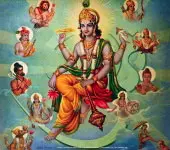King Trishanku, of the Ikshvaku dynasty, longed to ascend to heaven in his mortal body. This desire went against the natural order. To achieve this, he sought the help of the sage Vishwamitra, renowned for his spiritual power.
Vishwamitra, moved by Trishanku’s wish, agreed to help him despite the opposition from the gods, including Indra, the king of the heavens. As Vishwamitra tried to send Trishanku to heaven, the gods resisted and pushed him back to Earth. However, Vishwamitra used his power to stop Trishanku mid-air. This left Trishanku suspended between heaven and earth, neither fully in the realm of the gods nor on Earth, eternally hanging in the sky.
The story of Trishanku connects to modern life in several ways:
1. Conflict Between Wants and Reality:
Trishanku wanted to reach heaven in his mortal body, which was against nature. Similarly, people today often struggle when their desires clash with what is possible. This creates stress and leaves them stuck between wanting more and facing reality.
- Example: A person dreams of becoming a world-famous singer but lacks the talent or opportunities. Their desire clashes with reality, leading to frustration and a feeling of being stuck.
2. Endless Pursuit of More:
Just like Trishanku's desire to reach heaven, people today constantly seek more—whether it’s money, status, or experiences. However, this pursuit often leaves them unsatisfied, as reaching one goal only leads to wanting something else, creating a never-ending cycle.
- Example: Someone who keeps seeking higher-paying jobs or more luxury items finds no lasting satisfaction. Each achievement only sparks a new desire, trapping them in a cycle of endless striving, never content.
3. The Risks of Overreaching:
Trishanku aimed for something beyond his reach, which left him in a state of limbo. Similarly, when people aim too high without considering their limits, they risk feeling stuck or failing to achieve their goals. This can lead to a sense of being trapped, much like Trishanku’s suspension between heaven and earth.
- Example: A business owner expands too quickly, taking on more than they can manage. This overreach may lead to failure, leaving them stuck, trapped by their own ambition, much like Trishanku’s eternal suspension.
4. Fear of Missing Out:
Trishanku’s desire to be part of the heavenly realm mirrors the modern fear of missing out on opportunities. This fear drives people to chase after experiences or achievements, even when it may not be right for them, often leading to stress and dissatisfaction.
- Example: A person constantly checks social media, seeing others living exciting lives. This fear of missing out pushes them to chase similar experiences, leading to stress and dissatisfaction, much like Trishanku’s desire to belong in heaven.
5. Struggle with Human Limits:
Trishanku’s story highlights the struggle between human desires and natural limits. Just as Trishanku tried to defy his mortal condition, people today often strive for more than what is possible, leading to frustration and a sense of being caught between dreams and reality.
- Example: Someone sets an unrealistic goal, like becoming a billionaire in a short time without resources. As they struggle against these limits, they feel stuck between their dreams and the reality, much like Trishanku’s situation.
Learnings
- Respect Natural Limits: Trishanku’s desire to defy the natural order led to his eternal suspension, teaching the importance of accepting human limitations.
- Consequences of Overreaching: Trishanku’s attempt to reach beyond his rightful place resulted in a state of limbo, highlighting the dangers of overambition.
- Divine Will Prevails: Despite Vishwamitra’s powers, the gods ultimately influenced Trishanku’s fate, underscoring that divine will is supreme.
Comments
Read more comments
Knowledge Bank
In Mahabharata, who is Antakatmaja?
Antakatmaja means daughter of the God of death. She was the paternal grandmother of King Prithu, mother of King Vena.
Whose incarnation was Bhishma?
Bhishma was incarnation of one among the Ashta-Vasus.
Quiz
Recommended for you
Gajavadana Maam Pahi

Do you know who gives light to Sun?

Subramanya Gadyam

puraharanandana ripukulabhanjana dinakarakot'iroopa parihri'talokataapa shikheendravaahana mahendrapaalana vidhri'tasakalabhuvanamoola vidhutanikhilad....
Click here to know more..